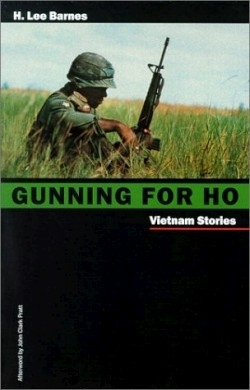Gunning For Ho
Vietnam Stories
The abundant fictional accounts and memoirs by and about those who served in America’s most divisive conflict other than the Civil War illustrate the war’s still raging impact on veterans and their families. Probably no other war inspired a body of literature where fiction so naturally co-mingles with non-fiction. Vietnam veteran Barnes demonstrates that fiction is a sensible alternative for coping with the often-tragic personal legacies of the war; veterans should not always be faulted for inaccurate memories forged under wartime situations where survival is the most important objective.
The six stories and one novella that are included here allow Barnes to realistically describe through simple, stark language the fears, growing distrust of the military and the essential camaraderie among the grunts. “A Lovely Day in the A Shau Valley” is a story of an unlikely but very civil baseball game between a Communist patrol and American troops which sets the tone for the grunt code: “field hardened, conditioned like tennis players, they carried around sixty pounds of gear…it was essential to survival that every man depend on every other man. They believed in each other when there was nothing else to believe in. And that’s what made them men.”
Barnes offers a perspective that many veteran-authors do not. He wrote these stories thirty years after his 1966 tour. Consequently, his most moving stories are those that illuminate the war’s impact on the grunts and their families many years after the war ended. “The Cat in the Cage” tells of a father’s search for his son who was captured by the Viet Cong and paraded like a caged animal through villages. “A Return” is a moving portrayal of a father who disapproved of his son’s enlistment and now must come to terms with his death fifteen years later.
The novella, “Tunnel Rat,” is the harrowing tale of a soldier given the dangerous assignment of searching the vast tunnel network built to protect communist troops from American bombs, where self-preservation “came down to getting home. Body count meant little if you weren’t alive to do the counting.” The title story, “Gunning For Ho,” shows that surviving Vietnam provides no other guarantees.
John Pratt, in the Afterword, compares Barnes to Tim O’Brien and W.D. Ehrhart, two veterans whose excellent fiction is based on their Vietnam experiences. In addition, Barnes is reminiscent of Robert Olen Butler, whose 1993 Pulitzer Prize winning collection of stories, A Good Scent from a Strange Mountain, is praised for capturing the unforgettable and unforgiving memories of those who served.
Reviewed by
Karl Helicher
Disclosure: This article is not an endorsement, but a review. The publisher of this book provided free copies of the book to have their book reviewed by a professional reviewer. No fee was paid by the publisher for this review. Foreword Reviews only recommends books that we love. Foreword Magazine, Inc. is disclosing this in accordance with the Federal Trade Commission’s 16 CFR, Part 255.

